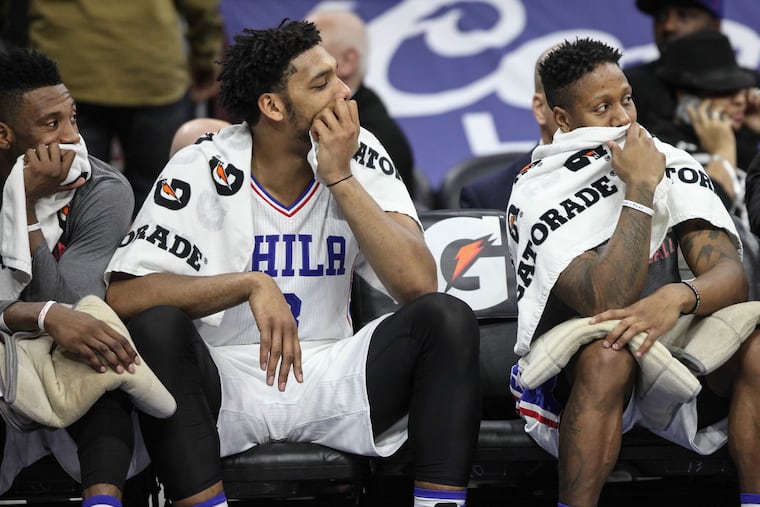Robert Covington, a product of the ‘Process’, can empathize with today’s Detroit Pistons
His Sixers team dropped 28 consecutive games to set the longest losing streak of any kind in U.S. professional sports.

ORLANDO, Fla. — Robert Covington knows what the Detroit Pistons are experiencing.
The reserve forward, now in his second go-round with the team, was a member of the 76ers squad that lost 28 consecutive games to set the longest losing streak of any kind in U.S. professional sports.
The Sixers’ record was established during the end of the 2014-15 season and the start of 2015-16. They concluded the 2014-15 season with 10 consecutive losses and began the 2015-16 season with 18 more on the way to a 10-72 record. Covington caught both ends of the streak after signing with the Sixers on Nov. 15, 2014, a couple of weeks after being waived by the Houston Rockets. He was traded to the Timberwolves in November 2018 before returning last month in the James Harden trade.
» READ MORE: Sixers have ‘a new challenge’ — proving they can win without Joel Embiid
Flashing forward, the Pistons lost their 27th consecutive game in a 118-112 defeat against the Brooklyn Nets on Tuesday. That broke the 26-game, single-season mark shared by the 2013-14 Sixers and 2010-11 Cleveland Cavaliers.
With a loss to the Boston Celtics on Thursday, Detroit will tie the Sixers for the longest overall losing streak. And with losses to Boston and then the Toronto Raptors on Saturday, the Pistons would replace the Sixers in the history books for futility.
“You don’t wish that on anybody,” Covington said. “To me, it doesn’t really matter. It’s just unfortunate. It’s not like you care about it at the end of the day.
“It’s going to be good teams, and it’s going to be bad teams. You are going to go through stuff like that. But nobody really cares.”
There was some optimism surrounding Detroit heading into the season.
» READ MORE: Sixers’ Mo Bamba excited about Orlando return to face former Magic teammates: ‘That’s family’
The franchise hired Monty Williams, a former Sixers assistant and NBA Coach of the Year while leading the Phoenix Suns, to a six-year, $78.5 million deal to coach the collection of young talent.
The Pistons (2-28) started the season 2-1 with victories over the Charlotte Hornets and Chicago Bulls. However, the 118-102 victory on Oct. 28 over the Bulls has been their last.
“Their situation is they’re still developing,” Covington said of the Pistons. “They’re young. It’s hard to win in this league when you go through that. You see what happened [with the Sixers]. We had to go through a couple of years of that before we actually turned good.”
Unlike the Pistons, the Sixers were in the midst of multi-season tanking, which was recognized as “The Process.”
The Sixers roster was intentionally loaded with fringe players while the team lost games during the 2013-14, 2014-15, and 2015-16 seasons and part of 2016-17. Back then, the expectation was that players would struggle shooting, would turn the ball over at an alarming rate, surrender huge leads, and have trouble compiling wins.
“We were trying to win a little, but it was like our whole purpose was for [getting top] draft picks,” Covington said. “[The Pistons] are developing their draft picks. So it’s completely different. It’s unfortunate. It’s a bunch of young players. It’s a bunch of young guys that [have] to go through the development process.”
But regardless of the plan, losing 27 games in a row can take a mental toll. That’s why former Sixers coach Brett Brown routinely brought in special speakers, often unrelated to sports, to talk to the team. It was Brown’s way of keeping players engaged.
» READ MORE: Joel Embiid’s not only the NBA best’s player. The Sixers center is better than last year’s MVP season.
“That’s the main thing, is trying to not lose [players] through it, keeping them going,” Covington said. “We had certain things throughout the day or trips — like incentives and goals that we were trying to accomplish. Those are the things that kept us engaged.”